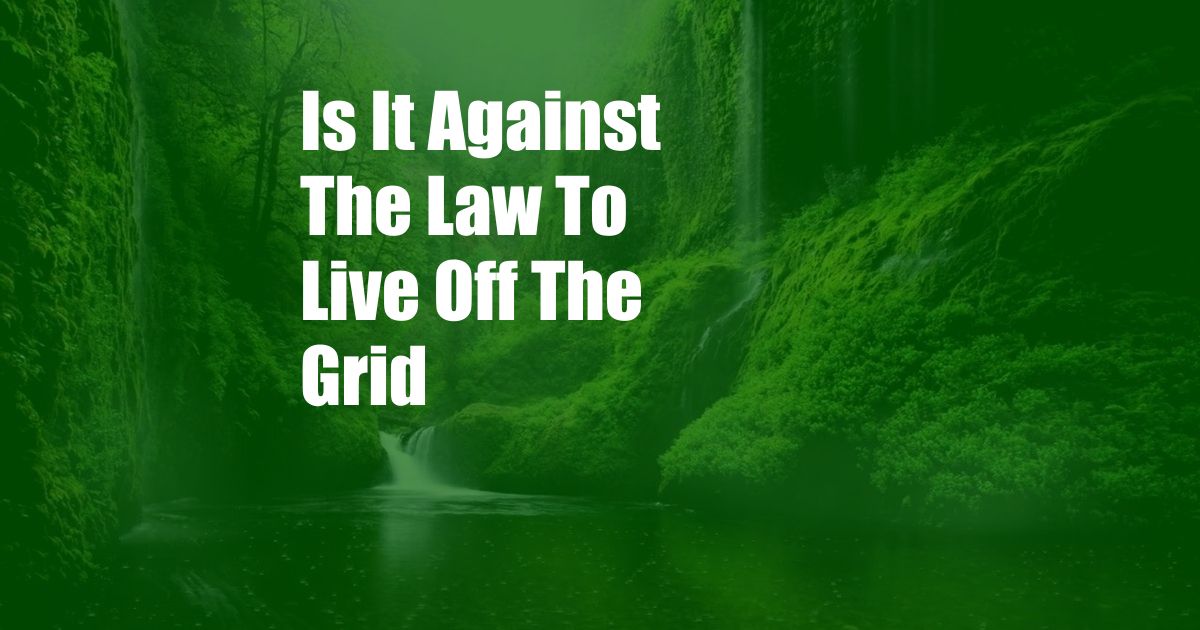
Is It Against the Law to Live Off the Grid?
Imagine yourself far removed from the bustling city life, nestled amidst nature’s embrace, where the symphony of birdsong replaces the cacophony of traffic, and the gentle rustling of leaves whispers secrets in place of human chatter. This enchanting vision of off-grid living captivates many who yearn for a life less tethered to modern conveniences. But before embarking on this alluring path, it’s essential to delve into the legality of such a lifestyle.
In this comprehensive guide, we’ll explore the intricacies of off-grid living, shedding light on the legal implications, historical context, and practical considerations associated with this alternative lifestyle.
Navigating the Legal Maze of Off-Grid Living
Contrary to popular belief, living off the grid is not inherently illegal. However, the legality of such a lifestyle hinges on adhering to specific regulations and obtaining necessary permits. Zoning laws, building codes, and environmental regulations vary widely across jurisdictions, so it’s imperative to conduct thorough research on local and state laws before embarking on this adventure.
Zoning laws often dictate the permissible uses of land, including restrictions on residential or commercial activities. Building codes establish specific standards for construction, ensuring the safety and habitability of structures. Environmental regulations aim to protect natural resources, limit pollution, and minimize the ecological impact of human activities.
Historical Roots of Off-Grid Living
The concept of living off the grid is not a modern invention. Throughout history, humans have sought refuge in remote areas, often due to religious beliefs, persecution, or economic hardship. In the United States, the homesteading movement of the 19th century encouraged settlers to claim land and establish self-sufficient homesteads on the frontier.
In more recent times, the rise of environmentalism and the growing desire for sustainable living have fueled interest in off-grid lifestyles. People seek to reduce their environmental footprint, embrace renewable energy sources, and live in harmony with nature.
Essential Considerations for Off-Grid Living
Living off the grid involves a shift from relying on external utilities to generating power, water, and food independently. This transition requires careful planning and implementation. Power can be generated through solar panels, wind turbines, or a combination of both. Water can be sourced from wells, rainwater collection systems, or nearby water sources.
Food production is a crucial aspect of off-grid living. Establishing a garden or raising livestock provides a sustainable source of sustenance. It’s also essential to learn basic homesteading skills, such as food preservation, animal husbandry, and basic carpentry, to maintain and improve one’s living environment.
Expert Tips and Advice for Off-Grid Living
Embarking on an off-grid lifestyle requires careful preparation and adaptability. Here are some valuable tips from experienced off-grid residents:
Embrace sustainability: Reduce waste, conserve energy, and adopt environmentally friendly practices to minimize your ecological impact.
Develop a comprehensive skill set: Acquire practical knowledge in areas such as gardening, animal husbandry, construction, and maintenance to ensure self-sufficiency.
Build a supportive community: Surround yourself with like-minded individuals who share your values and provide assistance during challenging times.
Commonly Asked Questions About Off-Grid Living
Q: Is it possible to live off the grid completely?
A: While many aspects of life can be made independent, it may not be entirely feasible to live completely isolated from society. Access to certain services, such as healthcare or emergency assistance, may still require occasional interaction with urban areas.
Q: What are the challenges of off-grid living?
A: Challenges include navigating legal regulations, sourcing reliable energy and water, maintaining food security, and adapting to the isolation and lack of certain conveniences.
Q: Is off-grid living expensive?
A: The initial investment in infrastructure, such as solar panels or a well, can be costly. However, ongoing expenses, such as fuel or utility bills, are significantly reduced.
Q: Is it safe to live off the grid?
A: Safety depends on proper planning and preparedness. Taking precautions against wildlife, securing access to medical care, and building a support network can help ensure safety.
Conclusion: Embracing a Life Less Ordinary
Living off the grid is not for everyone. It requires a strong sense of self-reliance, a passion for sustainability, and a willingness to embrace a life less tethered to modern conveniences. However, for those who seek the freedom, independence, and connection to nature that off-grid living offers, it can be an incredibly rewarding experience.
If you find yourself drawn to this path, conduct thorough research, connect with other off-grid residents, and seek expert advice to embark on this adventure with confidence. The choice to live off the grid is ultimately a personal one, and only you can decide if it aligns with your aspirations and values. Embrace the opportunity to explore, adapt, and create a life that is uniquely your own, beyond the constraints of conventional living.